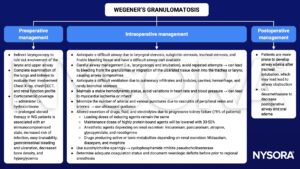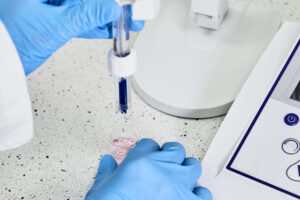Learning objectives
- Describe Wegener’s granulomatosis
- Recognize the symptoms and signs of Wegener’s granulomatosis
- Anesthetic management of a patient with Wegener’s granulomatosis
Definition and mechanisms
- Wegener’s granulomatosis (WG) is a chronic, immunologic, systemic disease, characterized by a triad of necrotizing granulomas in the upper and lower respiratory tract, small- and medium-sized vessel vasculitis, and glomerulonephritis
- Involvement of the upper respiratory tract (i.e., nose and sinuses) is seen in nearly all WG patients
- Early diagnosis and treatment might lead to a full recovery
- Without treatment, the condition can be fatal
Signs and symptoms
Signs and symptoms develop suddenly or over several months
- Pus-like drainage with crusts from your nose, stuffiness, sinus infections, and nosebleeds
- Coughing, sometimes with bloody phlegm
- Shortness of breath or wheezing
- Fever
- Fatigue
- Joint pain
- Numbness in the limbs, fingers, or toes
- Weight loss
- Blood in urine
- Skin sores, bruising, or rashes
- Eye redness, burning or pain, and vision problems
- Ear inflammation and hearing problems
Complications
- Hearing loss
- Skin scarring
- Chronic kidney disease
- A loss of height in the bridge of the nose (saddling) caused by weakened cartilage
- Deep vein thrombosis
Treatment
Combination of corticosteroids and cytotoxic agents to induce and maintain remission
| Severe disease | Induce remission with immunosuppressants (e.g., rituximab or cyclophosphamide) in combination with high-dose corticosteroids (e.g., prednisone) Plasmapheresis if kidneys are involved Steroid dose is tapered slowly after remission → focus shifts to maintain remission state and prevent subsequent WG flares → less toxic immunosuppressants (e.g., rituximab, methotrexate, azathioprine, leflunomide, or mycophenolate) |
| Limited disease | Combination of methotrexate and corticosteroids Steroid dose is reduced after remission and methotrexate is continued as maintenance therapy |
Management

Suggested reading
- Sharma J, Lal J, Gehlaut P, Amanpreet, Dhawan G, Yadav A. Wegener’s Granulomatosis and Anaesthetic Implications: A Case Report. Int J Med Res Prof. 2018; 4(1): 479-81.
- Frost EAM. Wegener’s Granulomatosis, PHACE Syndrome: Rarities With Anesthetic Implications. December 20, 2018. Accessed January 26, 2023. https://anesthesiaexperts.com/uncategorized/wegeners-granulomatosis-phace-syndrome-rarities-anesthetic-implications/.
We would love to hear from you. If you should detect any errors, email us customerservice@nysora.com







